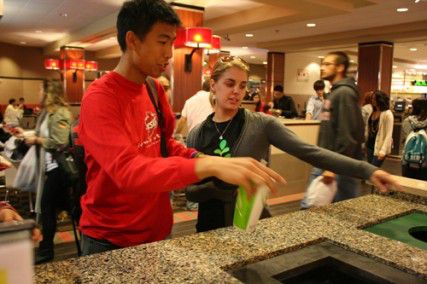
The top right corner of many Boston University recycling bins reads, “If you can rip it, recycle it.” However, many students say they are unsure how to recycle different cups sold in stores on campus.
The recycling process for the university community is complicated because two different types of paper cups are sold around campus.
Sabrina Pashtan, sustainability coordinator for BU Dining Services, said that the cups sold at Starbucks, Dunkin’ Donuts, Jamba Juice, Einstein’s Bagels and City Convenience have a petroleum-based liner that would prevent the cup from decomposing.
Soy-based recyclable are used by the George Sherman Union, Healthy Blends, the Law School Café, Late Nite Cafés, Raising Cane’s, Olecito and Buick Street Market.
“Our goal is to use the compostable cups as much as possible,” Pashtan said. “There are restrictions when dealing with certain national brands such as Starbucks, Jamba Juice, Dunkin’ Donuts and Subway. We are working with these brands for compostable cup solutions.”
BU classroom buildings have one receptacle for garbage, one for recycling bottles and cans and one for recycling paper. The lids on the paper bins have slots to fit office paper, making it inconvenient for students to dispose of paper coffee cups.
Jose Torres, a caterer at the GSU, said he does not bother to “rip” and “recycle” his coffee cup as the bin’s design gives him the impression that the receptacle only holds office paper.
“At the GSU, I recycle. If I’m here [in CAS], I don’t because there are no paper cups recycling bin, so I throw it in the trash,” he said.
“I think there is a real information gap,” said CAS professor Cutler Cleveland, co-chair of the Sustainability Steering Committee, a group that advises BU on sustainability issues.
Cleveland said Sustainability and companies should address this lack of coordination, whether by providing compostable cups or educating students about commingling.
“We need to encourage students to not use paper cups at all,” he said. “But short of that, it will be difficult since so many students use those paper cups.”
“If I’m not in a hurry, I take the time and try to find the right bin,” said Maria Fitzgerald, a junior in the College of Communication. “In any case, there are times when I just dump [my cup from Starbucks] in the garbage.”
While these companies are not using compostable cups, some have made other compromises such as switching from Styrofoam to paper cups.
The cups that cannot be recycled with paper can still be recycled with the cans and bottles, Pashtan said. While the bins allow for commingled recycling, the label “Cans & Bottles” could be misleading, some students said.
CAS senior Chelsea Humphrey said she did not know where to dispose her paper cups outside of the GSU and that she was unaware BU offered mixed recycling.
“If paper cups are allowed to mix with the glass and plastic, [the school] should put a sign,” she said.
“I think our goal should be two-fold,” Pashtan said. “Our first priority is to educate students and the university community on the importance of carrying our own reusable mug, for both coffee and water. Second, it is important that the industry move in the right direction, towards compostable beverage cups. Cups with a higher-recycled content would be a good start.”























































































































